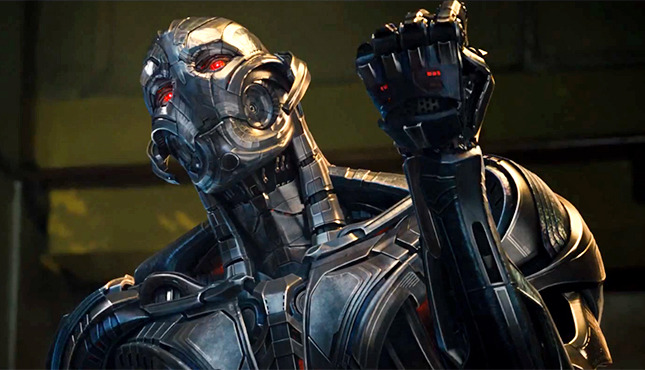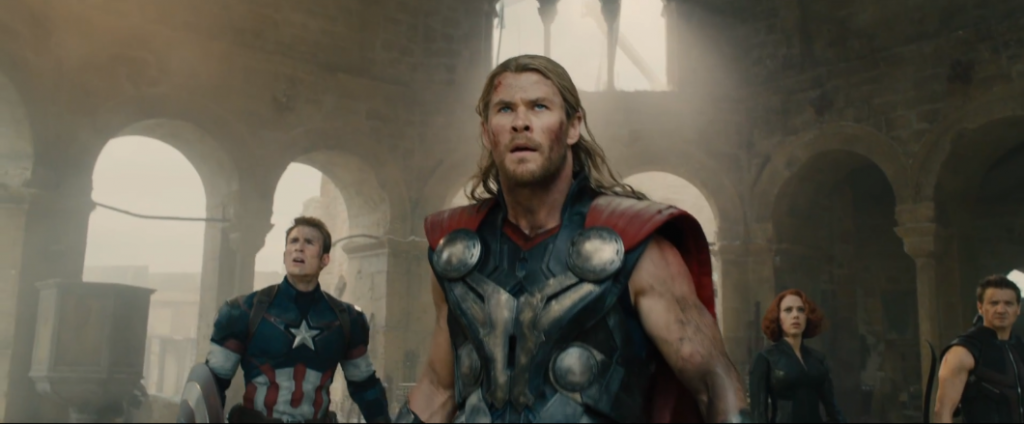The Avengers 2: Age of Ultron (2015)
CAST: Robert Downey Jr., Chris Evans, Chris Hemsworth, Mark Ruffalo, Scarlett Johansson, Jeremy Renner, Samuel L. Jackson, Elizabeth Olsen, Aaron Taylor-Johnson, Paul Bettany, Don Cheadle, Anthony Mackie, Cobie Smulders, Stellan Skarsgard, Idris Elba, Andy Serkis, Thomas Kretschmann, James Spader (voice)
REVIEW:
As a second “all hands on deck” assembling of the historic all-star team-up of 2012’s The Avengers, Age of Ultron underwhelms. While Captain America: The Winter Soldier managed to be a worthy adventure in its own right, other chapters like Iron Man 3 and Thor: The Dark World felt like obligatory filler, something to pass the time in between Avengers films that you could skip without missing much, but unfortunately Age of Ultron lacks the freshness and giddy sense of glee that made the first Avengers such an infectiously enjoyable spectacle. Seeing Iron Man, Captain America, Thor, The Hulk, and company all united onscreen isn’t as novel an experience as it was three years ago, and their adventure here feels more obligatory than epic.
We pick up some time after The Winter Soldier and S.H.I.E.L.D.’s collapse after the discovery and thwarting of the HYDRA conspiracy in its midst and jump straight into the action, with Tony Stark/Iron Man (Robert Downey Jr.), Steve Rogers/Captain America (Chris Evans), Natasha Romanoff/Black Widow (Scarlett Johansson), Bruce Banner/Hulk (Mark Ruffalo), and Clint Barton/Hawkeye (Jeremy Renner) raiding one of the last standing HYDRA strongholds in Eastern Europe, where HYDRA agent Baron von Strucker (Thomas Kretschmann) has been developing advanced robotics and conducting human experimentation with the help of Loki’s lost scepter. Once The Avengers have the scepter in their possession, Tony and a reluctant Banner team up behind the others’ backs to use Loki’s scepter to finish the artificial intelligence work Strucker had started, with the goal of creating a massive robotic army to defend the Earth against the always looming threat of another assault from the aliens who attacked Earth in The Avengers. As it as a way of doing in movies, the AI creation gets ideas of its own, and Ultron (voice and motion capture performance by James Spader) is born. Ultron quickly becomes determined that he can save the world by wiping out mankind and sets busily to work sending his consciousness across the globe via the internet and constructing his own robot army to take on The Avengers. Meanwhile, infighting threatens to fracture the team, but Tony forges on with his AI experiments to create a nemesis for Ultron, and Vision (Paul Bettany) is born. But Ultron has two aces up his sleeve, a pair of super-powered twins, mind-manipulating telekinetic Wanda/Scarlet Witch (Elizabeth Olsen) and lightning-fast Pietro/Quicksilver (Aaron Taylor-Johnson), who have a personal grudge against Tony.
 There’s a lot going on in Age of Ultron, building up to a megalomaniacal endgame that’s over-the-top and unnecessarily convoluted even by comic book supervillain standards, and writer-director Joss Whedon doesn’t do as even-handed of a job juggling all the balls this time. There are too many bits that don’t work. The sluggish downtime midway through at Hawkeye’s family farm is a chore to sit through, and the scenes with Hawkeye’s previously unknown family meant at giving him some character development are not only sappy, but feel as obligatory as they are. Another element that falls flat is the budding romance between Black Widow and Banner. Not only is there no chemistry between Scarlett Johansson and Mark Ruffalo, but her sudden interest in Banner feels out-of-left-field, considering The Winter Soldier seemed to develop sexual tension between she and Captain America. Actually, Whedon seems to ignore the seismic shifts The Winter Soldier inflicted–or should have inflicted–on the MCU as much as possible. The climax of that movie seemed to leave things shaken up bigtime from the status quo, but here it’s back to business as usual, with the events of The Winter Soldier swept under the rug apart from the opening HYDRA raid and occasionally being referenced in passing in ways that feel obligatory and perfunctory. The new kids on the block, the Maximoff twins, are underdeveloped and underused, and Quicksilver’s super-speed powers were much better portrayed with the version of the character that showed up in X-Men: Days of Future Past (where he was played by Evan Peters with a panache that Aaron Taylor-Johnson lacks). A death has little or no emotional impact because we don’t really care about the character involved. There is plenty of action, but too much of it turns into a CGI-fest with endless battles between The Avengers and Ultron’s seemingly limitless hordes of identical minions. Too much of this kind of thing gets old. Unsurprisingly, Joss Whedon keeps the dialogue sharp, with one-liners flying back and forth rapid-fire. The chemistry and camaraderie among the cast still shines through; an early party scene where everyone takes turns trying to lift Thor’s hammer is as or more entertaining than the over-the-top action sequences.
There’s a lot going on in Age of Ultron, building up to a megalomaniacal endgame that’s over-the-top and unnecessarily convoluted even by comic book supervillain standards, and writer-director Joss Whedon doesn’t do as even-handed of a job juggling all the balls this time. There are too many bits that don’t work. The sluggish downtime midway through at Hawkeye’s family farm is a chore to sit through, and the scenes with Hawkeye’s previously unknown family meant at giving him some character development are not only sappy, but feel as obligatory as they are. Another element that falls flat is the budding romance between Black Widow and Banner. Not only is there no chemistry between Scarlett Johansson and Mark Ruffalo, but her sudden interest in Banner feels out-of-left-field, considering The Winter Soldier seemed to develop sexual tension between she and Captain America. Actually, Whedon seems to ignore the seismic shifts The Winter Soldier inflicted–or should have inflicted–on the MCU as much as possible. The climax of that movie seemed to leave things shaken up bigtime from the status quo, but here it’s back to business as usual, with the events of The Winter Soldier swept under the rug apart from the opening HYDRA raid and occasionally being referenced in passing in ways that feel obligatory and perfunctory. The new kids on the block, the Maximoff twins, are underdeveloped and underused, and Quicksilver’s super-speed powers were much better portrayed with the version of the character that showed up in X-Men: Days of Future Past (where he was played by Evan Peters with a panache that Aaron Taylor-Johnson lacks). A death has little or no emotional impact because we don’t really care about the character involved. There is plenty of action, but too much of it turns into a CGI-fest with endless battles between The Avengers and Ultron’s seemingly limitless hordes of identical minions. Too much of this kind of thing gets old. Unsurprisingly, Joss Whedon keeps the dialogue sharp, with one-liners flying back and forth rapid-fire. The chemistry and camaraderie among the cast still shines through; an early party scene where everyone takes turns trying to lift Thor’s hammer is as or more entertaining than the over-the-top action sequences.
All the leading cast members here could probably play these roles in their sleep by now. The returning Avengers are exactly what we’d expect from them, with Robert Downey Jr. the most charismatic and Jeremy Renner the least (which gives the time we spend on trying to give the rather dull Hawkeye a little depth somewhat tedious). Downey still tosses out sharp one-liners with the best of them, but Tony is a little more subdued and a little more serious here, facing his creation turning on him and the possibility of being inadvertently responsible for the deaths of his friends and the destruction of the world. Chris Evans and Chris Hemsworth don’t get much to do outside of the action scenes (the dangling plot threads of Cap’s search for his long-lost BFF Bucky Barnes, and Thor’s n’er-do-well brother Loki usurping the throne of Asgard, are stalled waiting to pick back up in Captain America: Civil War and Thor: Ragnarok). Elizabeth Olsen and Aaron Taylor-Johnson, here playing siblings after previously playing husband-and-wife in last year’s Godzilla reboot, are just as bland here as they were there, though part of that could be because in both movies they’ve been saddled with thinly-developed characters. Paul Bettany, who’s provided the voice of Tony’s personal computer Jarvis in every Iron Man and Avengers installment, finally gets more to do here as Vision, an AI counterpart to Ultron. Bettany brings a nice otherworldly nobility to the role, even though his screentime is limited and doesn’t start until about halfway through. Samuel L. Jackson returns as Nick Fury, though he doesn’t get as much to do here as in the first Avengers or The Winter Soldier. James Spader seems to be having a good time as Ultron, a megalomaniac robot who inherited Tony’s smartass sense of humor, although he never appears in the flesh. Ultron is one of the better Marvel cinematic villains thus far (though admittedly, other than Tom Hiddleston’s Loki, they’ve mostly been middle-of-the-road). There are walk-on roles for old friends like Don Cheadle, Anthony Mackie, Cobie Smulders, and Stellan Skarsgard, cameos by Idris Elba and Hayley Atwell, and small roles for Andy Serkis (making a rare appearance in the flesh instead of as a CGI creature) and Thomas Kretschmann. Thanos, slowly being built up as the biggest bad in the Marvel cinematic universe with cameos in The Avengers and Guardians of the Galaxy, makes a similarly obligatory blink-and-you’ll-miss-it cameo halfway through the end credits. Presumably in the upcoming two-part Avengers: Infinity War, Thanos’ voice and motion capture performer Josh Brolin will finally get more to do than be ominous for ten seconds at a time.
Avengers posed the question, “where do we go from here?”. Following Age of Ultron, the answer is known, with Marvel already building hype for Infinity War. In between, there is Captain America: Civil War and Thor: Ragnarok. Whether they can prove worthwhile on their own is a dubious proposition, however. I suspect going back to our Avengers fighting smaller-scale battles by themselves will continue to feel like filler until we get to the next “event” with the next team-up, when the stakes are likely to be higher than ever.
* * 1/2
